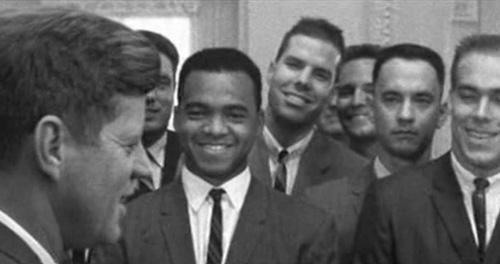“It was forty years ago today. Sgt. Pepper stopped the band to
play…” On April 10th 1970, Paul McCartney announced during an
interview about his first solo album that the Beatles, the most
famous pop group in history, would “never work together again.”
Those of us old enough to remember the shock, instantly knew
that John W. Gardner was wrong when he wrote “History never looks
like history when you are living through it.”
We saw the Beatles breakup as historic, but three astronauts
stranded in space aboard Apollo 13 a few days later was just a blip
in our mission to the moon. Similarly, we saw Earth Day, April
22nd, as a single publicity event for the counterculture resource
“The Whole Earth Catalog.” A week later, when National Guardsmen
shot and killed students protesting the Vietnam War at Kent State
University, it made history.
I know from working with junior high school students that
anything that happened before they were born is considered “ancient
history,” and Jonah Raskin, who teaches college students
communication studies at Sonoma State, tells me that most young
adults in his classes have the same perspective—the 1970’s are a
long, long time ago and have little relevance for today’s iPhone
enabled generation.
You may be wondering what all this has to do with movies. The
answer is simple: Movies are an easily accessible and engaging way
to share a little cultural history with the younger generation.
Here are some suggested double bills to watch together and talk
about afterwards:
THE BEATLES
“A Hard Day’s Night” (1964) is where the young
John, Paul, Ringo, and George have fun in Richard Lester’s
music-filled, Marx Brothers-style, mockumentary.
“Let It Be” (1970), Michael Lindsay-Hogg’s real
documentary filmed six years later is interesting because we can
see the once tiny cracks between the Fab Four will soon become
fissures of divisiveness.
THE RACE TO THE MOON
“The Right Stuff” (1983) is Philip Kaufman’s
heroic retelling of Tom Wolfe’s 1979 book about the recruitment and
training of the original Mercury Seven astronauts and the United
State’s first attempts at manned spaceflight.
“Apollo 13” (1995), director Ron Howard’s
amazing portrayal of the calm onboard the spacecraft, the
professionalism at Mission Control, the courage of the families and
the initial lack of interest from the public when three astronauts
are stranded in space was nominated for nine Oscars.
VIETNAM
“Platoon” (1986) is based on director Oliver
Stone’s personal experiences as an infantryman in Vietnam, and its
realistic, and harrowing portrayal of “ordinary guys” thrust into
war earned a Best Picture Oscar.
“The Fog of War” (2003), is Errol Morris’s
fascinating, Oscar-winning documentary showing Robert S. McNamara
reflecting on his “eleven lessons of war” and specifically the
weight of the 58,000 American service men and women who died in
Vietnam when he was U.S. Secretary of Defense. His lesson #9—“In
order to do good, you may have to engage in evil.”
EFFECTS of VIETNAM
“Forrest Gump” (1994) Robert Zemekis turns
Winston Groom’s novel about a simple man from Alabama into a
special effects and multiple Oscar-winning tour-de-force when
Forrest repeatedly stumbles into important events in U.S. history
as he discovers his mother was right when she told him: “Life is
like a box of chocolates—you never know what you’re gonna get.”
“Born On the Fourth of July” (1989) Tom Cruise earned a Best
Actor and director Oliver Stone a Best Director Oscar nomination
for their honest portrayal of Ron Kovic, a real-life,
wheelchair-bound Marine veteran of the Vietnam War who returned to
fight the anger and apathy back home.
EARTH DAY
“An Inconvenient Truth” (2006) is Davis
Guggenheim’s Oscar-winning documentary transformation of Al Gore’s
slide show into an engaging lesson on global warming.
“The Day After Tomorrow” (2004), is disaster
movie director Roland Emmerich’s over-the-top special effects
exercise of a near future when an Ice Age descends into the upper
United States.
Comments? Email Gil at: gi*********@*****st.net.









